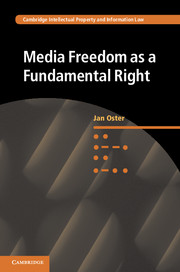Book contents
- Frontmatter
- Contents
- Preface and acknowledgements
- Table of cases
- Treaties, Conventions, Declarations and Statutes
- Reports and other documentary sources
- Introduction: aim, scope and method
- Part I The theoretical foundations of media freedom
- Part II General rules on media freedom
- Part III Specific limitations to media freedom
- 7 Personality rights and intellectual property as ‘rights of others’
- 8 Threats to public order interests: national security, territorial integrity, public safety and prevention of disorder and crime
- 9 The protection of health and morals
- 10 Maintaining the authority and impartiality of the judiciary
- 11 Incitement to hatred
- 12 Religiously offensive publications
- 13 Restrictions on commercial publications
- 14 Media pluralism
- Conclusion: tenets of a Media Freedom Principle
- Bibliography
- Index
- Cambridge Intellectual Property and Information Law
13 - Restrictions on commercial publications
from Part III - Specific limitations to media freedom
Published online by Cambridge University Press: 05 June 2015
- Frontmatter
- Contents
- Preface and acknowledgements
- Table of cases
- Treaties, Conventions, Declarations and Statutes
- Reports and other documentary sources
- Introduction: aim, scope and method
- Part I The theoretical foundations of media freedom
- Part II General rules on media freedom
- Part III Specific limitations to media freedom
- 7 Personality rights and intellectual property as ‘rights of others’
- 8 Threats to public order interests: national security, territorial integrity, public safety and prevention of disorder and crime
- 9 The protection of health and morals
- 10 Maintaining the authority and impartiality of the judiciary
- 11 Incitement to hatred
- 12 Religiously offensive publications
- 13 Restrictions on commercial publications
- 14 Media pluralism
- Conclusion: tenets of a Media Freedom Principle
- Bibliography
- Index
- Cambridge Intellectual Property and Information Law
Summary
The media is protected in a particularly strong way if it contributes to the public discourse on matters of general concern. Consequently, speech that is primarily disseminated for commercial or financial interests rather than with the aim of contributing to a debate of general concern, often named ‘commercial speech’, enjoys less protection. Remarkably, Article 7(4) Dutch Constitution even excludes commercial advertising entirely from the protection of the freedom of expression provision.
However, a distinction between ‘commercial speech’ and ‘publications on matters of public concern’ is not as clear-cut as it seems at first glance. Neither the public interest nor the publisher's intentions to achieve commercial success are as such suitable criteria to distinguish between, say, investigative news reporting and advertising. That is because, on the one hand, even advertising may relate to matters of public concern, because the public needs to be informed about the availability and characteristics of products and services on the market. Thus, commercial speech merits protection because it serves to inform consumers to enable intelligent opinions, and thus affects their economic well-being. On the other hand, even core investigative journalism is not altruistic. Newspaper companies print articles on matters of public interest because they want people to buy their newspapers. As the then-ECJ rightly observed in Satakunnan Markkinapörssi Oy and Satamedia Oy, a ‘degree of commercial success may even be essential to professional journalistic activity’.
Consequently, rather than categorising certain forms of speech under labels, in this case as ‘commercial speech’, one should apply a contextual approach, scrutinising the particular impugned statement.
When are publications ‘commercial’?
‘Commercial speech’ and ‘speech on matters of public concern’ are usually distinguished based on the motivation of the publisher. A producer of, for example, cosmetics publishes an advertisement because he intends to achieve commercial success by selling his products.
- Type
- Chapter
- Information
- Media Freedom as a Fundamental Right , pp. 249 - 255Publisher: Cambridge University PressPrint publication year: 2015



